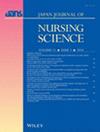Association of COVID-19-related violence and harassment with visiting nurses' mental health and intention to resign: A cross-sectional study in Japan
Abstract
Background
Prejudice related to the coronavirus disease 2019 (COVID-19) reportedly led to violence against healthcare workers by clients and their families. However, the impact of such violence and harassment on the mental health of visiting nurses during the pandemic remains unclear.
Aim
We aimed to examine the association of violence and harassment against visiting nurses with their mental health and intention to resign during the COVID-19 pandemic.
Method
We conducted an anonymous self-administered cross-sectional questionnaire survey to gain insight into the victimization, mental health, and personal resources (i.e., coping profiles and work engagements) among visiting nurses in Osaka. A multiple regression analysis and logistic regression analysis were used to identify associations between COVID-19-related violence and harassment and mental health or the intention to resign. Open-ended question data were assessed using content analysis to describe the details of the violence.
Results
Visiting nurses were victimized by various people, such as clients and their families, residents in communities they visited, their colleagues, and their own neighbors. COVID-19-related violence and harassment was not significantly associated with subjective psychological well-being but was significantly associated with the intention to resign.
Conclusion
Visiting nurses experienced a comprehensive range of COVID-19-related violence and harassment during the pandemic, which may have affected their intention to resign. Coping strategies may be a possible way to mitigate the impact of such violence and harassment. During a novel infectious disease outbreak, adopting a new perspective is crucial, and managing mood swings may be helpful as an emotional coping mechanism.

 求助内容:
求助内容: 应助结果提醒方式:
应助结果提醒方式:


